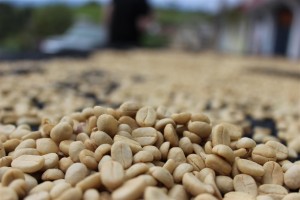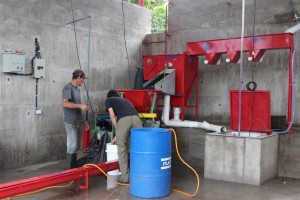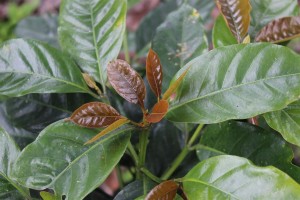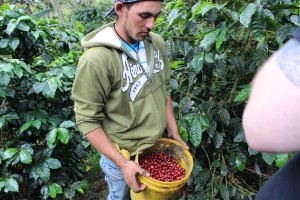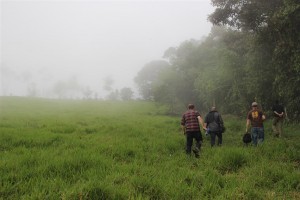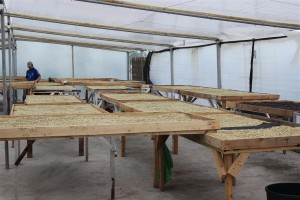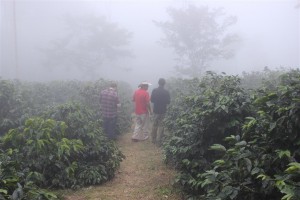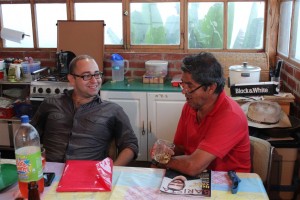Back
Ecuador Day 2: Farms in the Clouds
Well, we started out the day with another breakfast on the Hotel Quito, bacon, sausage, and strawberries, along with a healthy dose of coffee! I spent most of the breakfast finishing up the blog post from day 1, then had to rush around to pack up and meet our ride in the lobby at 8:30. Unfortunately, he was an hour late. Oh well.
We left the hotel at 9:40, and after an excruciatingly long stop at the bank (Nico had to grab cash to pay his workers), we were on our way to the town of Palmitopamba and two farms called La Nube and Maputo.
La Nube is actually owned by Nico, so we figured we’d start there. The first thing we saw pulling in was Nico brand new wet mill. He had finished installing it just a week prior, and it seems like it was running pretty smoothly. They were using a demucilagenator to remove the pulp, and then doing a 24 hour clean water soak on the coffee. I don’t think the demucilagenator was getting all the pulp off, and I think that they were actually doing a bit of wet fermentation in the rinse barrels. Regardless, it works!
So La Nube is located at 1300 meters, and the farm grows a variety of cultivars, including Bourbon, Typica, Caturra, and SL28. They keep the cultivars separate during processing, giving us an opportunity to again taste how cultivar
affects the cup. One of the things that struck me while hiking through Nico’s farm was the humidity in the air. They’re located in a very damp area, and this was evidenced by a fair amount of moss and lichen in the coffee trees. Nico and other farmers assured me that this does not affect cup quality, and after cupping a bunch of these coffees, I’d have to agree.
Another problem plaguing La Nube and other farms in Ecuador right now is coffee leaf rust. Unfortunately, there’s really not a lot they can do, except spray fungicides. They do try to spray in a conservative manner, and limit overspray. The plants were looking a little rough due to the fact that they stop spraying a few weeks before the harvest to give the trees times to shred the chemical before the coffee is processed.
After hanging out on Nico’s farm for a bit, we hopped a barbed wire fence, an electric fence, and followed Nico through a field as the afternoon fogs rolled in. It seriously felt like I was on some sort of coffee mission. Pretty sweet. We eventually got to Maputo, a really awesome farm just a short walk from La Nube.
Maputo is also located at about 1300 meters, and is owned by Henry and Verena Gaibor, who got into coffee farming about 4 years ago after retiring from the medical industry. Henry was a surgeon, and Verena was a midwife, and they met in Burundi while working with Doctors Across Borders. In fact, the farm is named after the capital of Mozambique. They retired, and decided to pursue their dream of growing coffee. Pretty cool!
Henry and Verena has actually also just installed a new wetmill, though one a bit smaller than Nico’s. In addition, their drying facilities were incredible. Very clean and well organized, with raised beds. In fact, they were even experimenting with some special prep naturals, which is pretty sweet.
On Maputo, you’ll find Caturra, Typica, Bourbon, SL28, and Kaffa cultivars, and again, they keep them separate in processing. Kaffa is an heirloom Ethiopian cultivar, and one I wouldn’t mind sampling! Unfortunately, I think they’re only going to produce something like 40 pounds of it this year.
Maputo has significantly fewer problems with coffee rust this year, though no one is sure why. The farm itself is beautiful, and the plants were gorgeous. One cool thing about Maputo is the fact that the farm is owner-managed, and Henry approaches the farm as he would a patient. Identify a problem, diagnose it, and take the steps to fix it. Also, Henry and
Verena require very strict quality adherence for their pickers, asking them to pick only the ripest cherries. They actually will keep picker lots separate until processing in order to check them. However, they end up paying their pickers (they employ about 20 during harvest) around double what is the normal wage in the rest of the country (about $600-700 a month). Very respectable.
After hiking the farm, we ended up in Henry and Verena’s house, drinking beer and whiskey, and talking about coffee and their time in Africa. Lots of good stories. We looked down at our watches, and realized the day was gone! We ended up hiking
back to Nico’s farm in the dark, and piled into his truck to make our way to a small eco-resort nearby in Mindo called Sachatamia, known well for their birdwatching. Everything was shut down when we arrived, but they still opened up for us. We grabbed our keys (and remote controls…not sure why they give them to you at the desk…), and headed to our little
villas, dropped our stuff, and came back to the main lodge for dinner. After a really nice meal, and a recap of the day, it was time for sleep…
Dave



